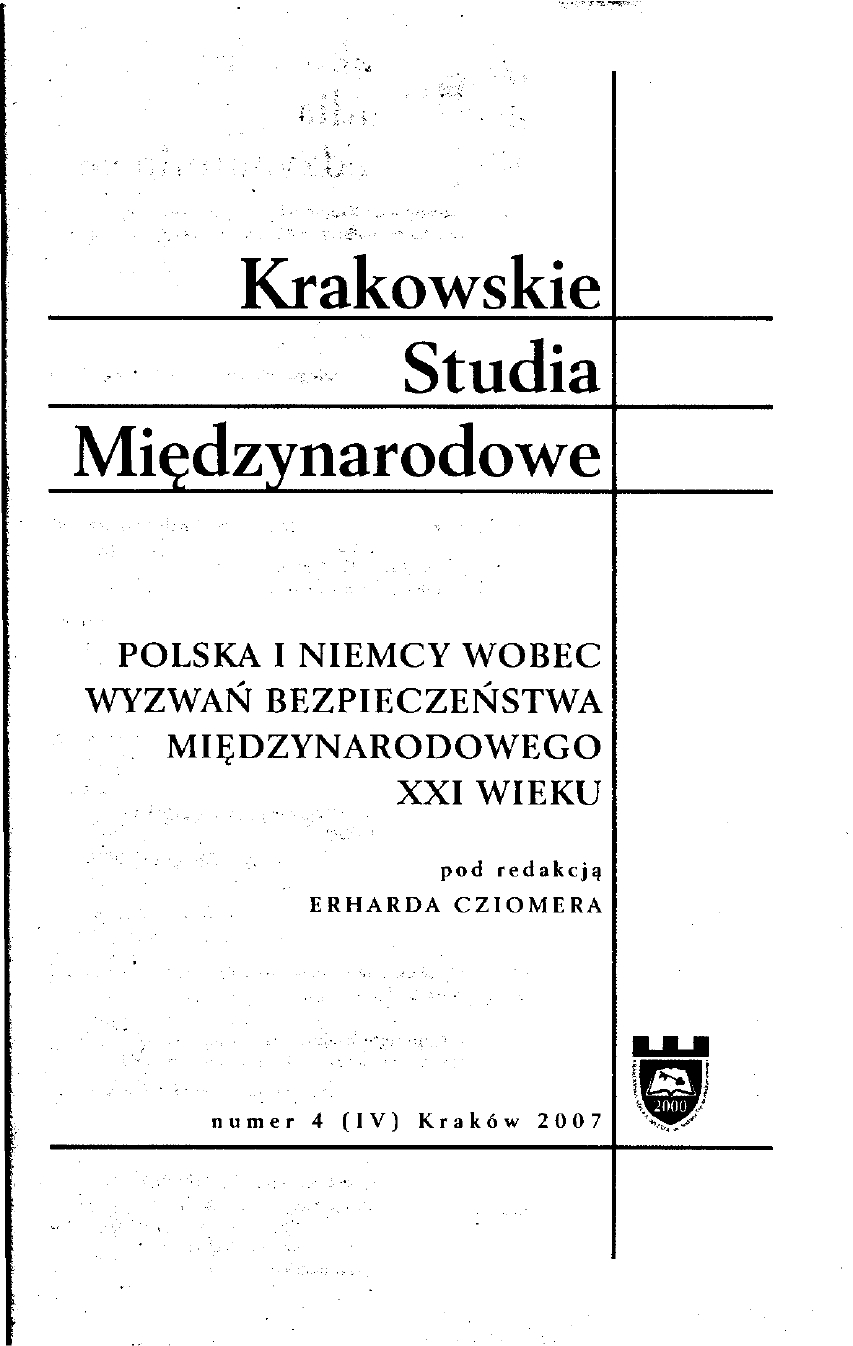Strategia bezpieczeństwa Niemiec w pierwszej dekadzie XXI wieku
German security strategy in the first decade of the 21st century
Author(s): Aleksandra ZiębaSubject(s): Security and defense
Published by: Oficyna Wydawnicza AFM Uniwersytetu Andrzeja Frycza Modrzewskiego w Krakowie
Summary/Abstract: After the reunification of 1990, Germany faced a choice: self-limitation in the area of foreign and security policy or assumption of “responsibility” for the futurę of the world. The Federal Republic supported the use of several means and avoided militarizing own security policy. Nevertheless, even though the dariger of armed attack was removed with the conclusion of the Cold War, new types of risks - born from local conflicts in the Balkans and other parts of the world, and from the intensifying transnational threats - arrived. In July 1994. The Federal Constitutional Court (BVerfG), decided that Germany may send Bundeswehr Armed Forces to peace and stabilization operations to “out of area” parts of the world. The main assumptions of post-Cold War security strategy of the Federal Republic were put down in the Guidelines for Defense Policy (Yerteidigungspolitische Richtlinien) of November 1992, and in the White Book 1994 (Weissbuch 1994. Weissbuch zur Sicherheit der Bundesrepublik Deutschland und zur Lage und Zukunft der Bundeswehr). At the turn of the 20th and early in the 21st centuries, a deep transformation took place in International order. It followed the expansion of NATO, after the so-called NATO war for Kosovo, and more clearly after the terrorist attacks of September 11, 2001. Germany’s answer to the new challenges and threats was the announcement of anti-terrorist packages (Anti-Terror Pakets) in September and December 2001, followed by the assumption of new Guidelines for Defensive Policy in May 2003. A few acts were passed in the wake of the “anti-terrorist packages”. On the international stage, Germany entered the anti-terrorist alliance, participated in a war in Afghanistan, where they continued to maintain a major armed force in the stabilization operation under the name Enduring Freedom. On the other harid, they refused to participate in the intervention against Iraq in March 2003 A new White Book on security of Germany and the future of Bundeswehr (Weissbuch zur Sicherheit Deutschlands und zur Zukunft7 der Bundeswehr 2006) was published in April 2006. The document restates that the basic interests of the Federal Republic in the scope of security and defense are the protection of freedom, safety and well-being of German citizens, and of sanctity of the territory of the state. The following were counted among tasks of internal security: prevention and management of regional conflicts, combating international terrorism, prevention of further proliferation of weapons of mass destruction, respect for human rights, reinforcement of international order based on international law, and support of free trade to reinforce the well-being of Germany, and span the gap between rich and poor regions. Task were formulated for the army (Bundeswehr) which can now be used (a novelty) also on German territory, e.g. in the case of a terrorist attack. It was confirmed that the main task of the Federal Army is ensuring national security and the defense of Germany, preparation to the defense of allies, and prevention of international conflicts and crisis management. It was emphasized that efficient implementation of the envisaged task reąuires modernization of the Bundeswehr structures. Since the turn of the century, the Federal Republic has continued the program of reforming Bundeswehr. Pertinent detailed and specific tasks were defined in reports Joint Security and the Futurę o f the Bundeswehr (Gemeinsame Sicherheit und Zukunfl der Bundeswehr) and Guidelines for further conceptual and planning, development of the Armed Forces (Eckwerte jur die konzeptionelle und planerische Weiterentwicklung der Streitkrafte) approved in May 2000, and in the concept developed by the Minister of Defence, Rudolf Scharping: The Bundeswehr — Advcmcing Steadily into the 21st Century: Cornerstones of a Fundamental Renewal. (Die Bundeswehr — sicher ins 21. Jahrhundert. Eckpfeiler fur Erneuerung von Grundauf) adopted by the govemment on June 14,2000. The main values in German security policy are: ensuring security for the state and its citizens, maintenance of the transatlantic relations, and focus on Europę. The roles that the Federal Republic declares to play on the international stage include those of Zivilmacht, Handelsstaat and a European power. Germany, besides France, invariably play the role of the “driving force” or “prime force” (Musterknabe) in European integration, and support European. Union’s effort to rank as a complex and versatile actor in the international stage international, that is the “European power”.
Journal: Krakowskie Studia Międzynarodowe
- Issue Year: IV/2007
- Issue No: 4
- Page Range: 65-78
- Page Count: 14
- Language: Polish

